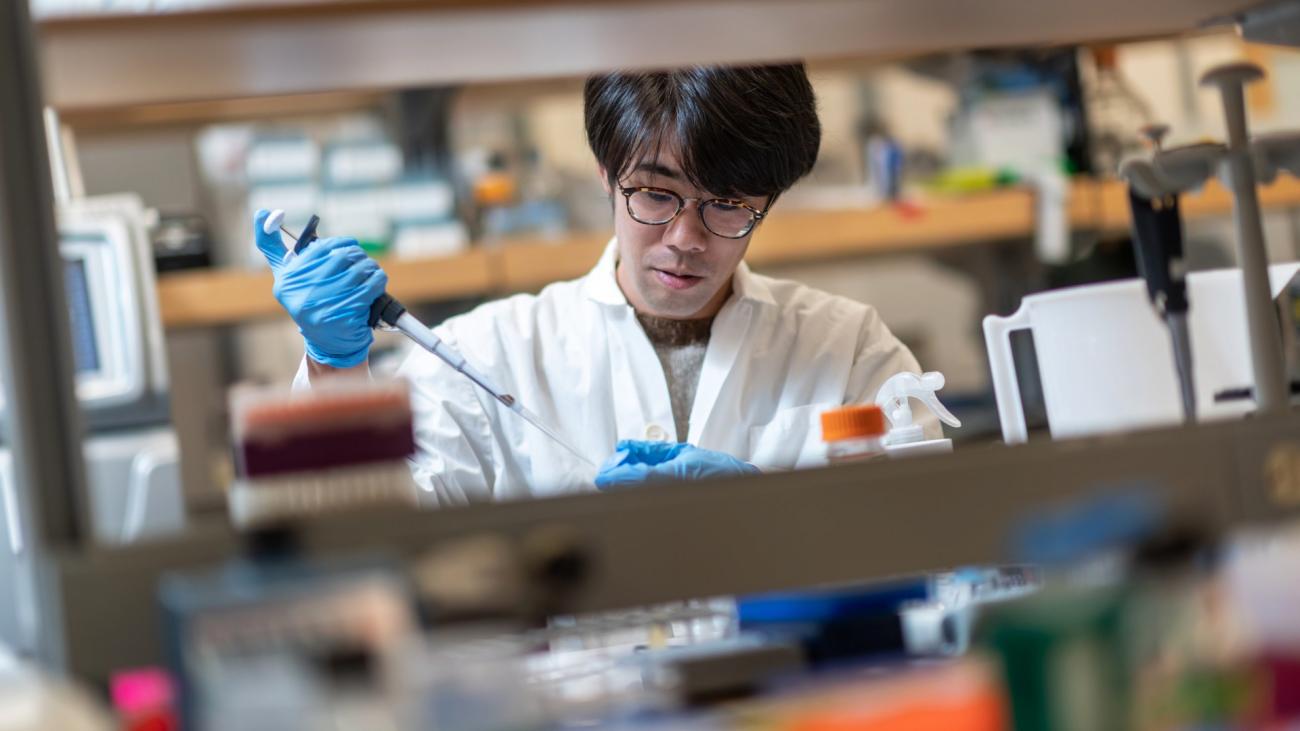UBC to lead biomedical innovation hub for lifesaving medicines
Canada’s biotech ecosystem is poised for a major boost with the federal government announcement on March 15 that B.C. will be home to Canada’s Immuno-Engineering and Biomanufacturing Hub (CIEBH).
The B.C.–based research and innovation hub, led by UBC, brings together a coalition of provincial, national, and international partners to position Canada as a global epicentre for the development and manufacturing of next-generation immune-based therapeutics.
A primary goal of CIEBH is to establish a seamless drug development pipeline that will enable Canada to respond to future pandemics and other health challenges in fewer than 100 days.
“This hub will build on the strengths of B.C.’s biotech and life sciences industry, and those of our national and global partners, to make Canada a world leader in the development of lifesaving medicines,” said Dr. Deborah Buszard, interim president and vice-chancellor of UBC. “It’s about creating a healthier future for all Canadians. Together with our outstanding alliance of partners, we will ensure Canada is prepared to respond rapidly to future health challenges with homegrown solutions.”
CIEBH is one of five new research hubs announced by the federal government that will work together to improve pandemic readiness and the overall health and well-being of Canadians. Federal funding of $570 million is available over the next four years to support project proposals associated with these hubs in order to advance Canada’s Biomanufacturing and Life Sciences Strategy.
This federal investment will enable UBC and its CIEBH partners to pursue an integrated program of biomedical research and talent development, along with building infrastructure to support the development and manufacturing of medical treatments in B.C. and Canada.
“The Immuno-Engineering and Biomanufacturing Hub (CIEBH) is a testament to Canada's commitment to innovation and collaboration and will position our country as a global leader in developing immune-based therapeutics,” said the Honourable Joyce Murray, Minister of Fisheries, Oceans, and the Canadian Coast Guard. "With its seamless drug development pipeline, CIEBH will help ensure Canada is prepared to respond to future pandemics and health challenges with leading-edge homegrown solutions found right here at the University of British Columbia.”
Aligning Canada’s biotech sector
More than 50 organizations representing the private, public, not-for-profit, and academic sectors have come together to form the hub, creating a rich environment that will bolster biomedical innovation in Canada. Among these partners are leading B.C. biotech companies that played a key role in Canada’s COVID-19 pandemic response and are developing cutting-edge treatments for a range of human diseases.
“We are pleased with this investment by the Government of Canada to build our life sciences industry and to see Canada’s Immuno-Engineering and Biomanufacturing Hub anchored in B.C.,” said Dr. Véronique Lecault, co-founder and chief operating officer, AbCellera. “Hubs such as CIEBH are important initiatives for building our country’s capabilities to translate scientific innovation into medicines that can help patients.”
CIEBH, led by UBC, will further align the critical mass of biomedical research strengths concentrated at B.C. academic institutions, including the B.C. Institute of Technology, Simon Fraser University, and the University of Victoria, as well as the clinical expertise of B.C. research hospitals and health authorities. With linkages to key partners across Canada, including Dalhousie University, the University of Waterloo, and the Vaccine and Infectious Disease Organization, the hub will create a national network to address gaps in Canada’s drug development pipeline.
Together, CIEBH’s partners will develop talent to fuel Canada’s biotech industry and ensure the entire drug development process — from research and discovery through to biomanufacturing, clinical trials, and commercialization — can happen domestically in B.C. and Canada.
“This partnership will position us for rapid and efficient response to future pandemics and public health crises,” said Dr. David Anderson, dean, Dalhousie Faculty of Medicine. “COVID-19 has proven how critical it is for us to harness the power of collaboration to accelerate vaccine research and development. Dalhousie is proud to partner with UBC and Canada’s Immuno-Engineering and Biomanufacturing Hub to enhance pandemic readiness and improve the overall health and well-being of Canadians.”
Unlocking the power of the immune system
In recent decades, B.C. has emerged as a global leader in immuno-engineering, a field that is transforming how society treats disease by harnessing and modulating the immune system.
B.C. academic institutions and prominent Canadian companies like Precision NanoSystems, Acuitas Therapeutics, and AbCellera have developed significant expertise in advanced immune-based therapeutics such as lipid nanoparticle– and mRNA–based vaccines, engineered antibodies, cell therapies, and treatments for antimicrobial resistant infections. UBC professor Dr. Pieter Cullis, a member of CIEBH’s core scientific team, has been widely recognized for his pioneering work developing the lipid nanoparticle delivery technology that enables mRNA therapeutics such as the highly effective COVID-19 mRNA vaccines.
“The future of medicine is happening right now, right here in Canada,” said UBC Vice-President, Health, Dr. Dermot Kelleher. “UBC researchers and spin-off companies enabled the development of the COVID-19 vaccine and other therapies at record speed. Now, through this hub, we will bring together the extraordinary expertise of B.C. and Canada’s biomedical community to bring transformative new health solutions to Canadians sooner.”
Anchoring the hub in B.C. will harness the province’s tremendous expertise across academia and industry to create a powerful national network to accelerate the development of immune-based therapeutics. For Dr. Kelleher, it’s a recipe for success that will position B.C.’s universities and biotech sector at the forefront of the world stage.
“B.C. is poised to become one of the world’s leading biotech and manufacturing hubs,” Dr. Kelleher added. “This fast-growing industry is playing a vital role in growing the province’s economy by attracting major interest from biotech and pharmaceutical companies from around the globe to B.C., sparking innovative spin-off companies, and creating jobs and opportunities for B.C. students, researchers, and the community.”
































